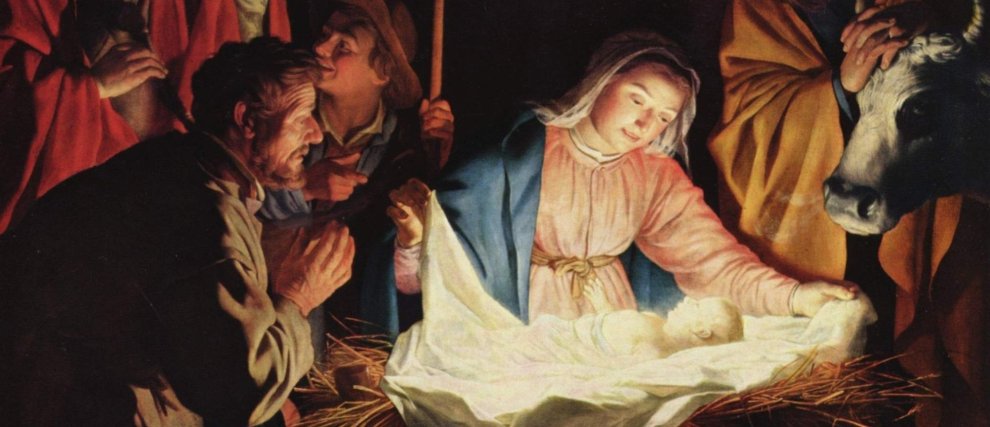Christmas Day, December 25th
Christmas, December 25, is the second major Christian feast in the liturgical calendar after Easter. This holy day celebrates the birth of Jesus, after a period of preparation - Advent - of four weeks. Discover the origins and meaning of Christmas day, as well as the many Catholic traditions that surround Christmas!
Christmas Day: origins and meaning
The history of the feast of Christmas
The feast of Christmas has only been celebrated since the second century: the first Christians did not commemorate the birth of Jesus Christ. It was around the year 330 that Emperor Constantine officially instituted the date of December 25 as a religious festival. The Catholic Church then set this date as the beginning of the liturgical year.
In the 3rd and 4th centuries, Christmas, the feast of the nativity, spread progressively in Europe and slowly replaced the pagan festivals linked to the winter solstice as well as the roman Saturnalia or Sol Invictus.
What is the meaning of Christmas for Christians?
Now a very popular holiday disconnected from its religious foundations, Christmas has an essential meaning for Christians. “Noel,” another word for Christmas, comes from the Latin “natalis” which means “birth, nativity”: the feast of Christmas celebrates the birth of Jesus Christ, son of God and redeemer announced by the prophets.
The feast of Christmas is thus the heart of the mystery of the incarnation, that is to say, God who became a man in order to save us from death and sin. In the creed, we also affirm: “for us men and for our salvation, he came down from heaven; by the Holy Spirit, he took flesh of the Virgin Mary and became man”.
At Christmas, we believe that God takes our human condition completely, becoming a little baby in the manger, while preserving his divine nature as a son of God. The name of Jesus, which means “God saves” in Hebrew, indicates Jesus' mission on earth. The evangelist John reveals to us that “God so loved the world that he gave his only son so that whoever believes in him will not be lost, but will have eternal life” (John 3:16). The feast of Christmas is therefore a great joy for Christians, because it already announces salvation, as the prophet Isaiah tells us: “See, your Savior comes!” (Isaiah 62:11).
Why is Christmas day on December 25?
The date of the celebration of Christmas, December 25, does not reflect any historical reality since we do not know the exact year (he was supposedly born between the years 7 and 2 BC) or the day of the birth of Jesus. The date of December 25 was chosen for its symbolic value since it is the day of the winter solstice. However, Christ who came to Earth is considered the “sun of justice”, and marks the arrival of new era!
Moreover, it is very likely that the date of December 25 was chosen to give a new Christian meaning to the various pagan festivals of ancient society. For Christians, the coming of the true light in the world is that of Christ!
The celebration of the feast of Christmas
The octave of the nativity
Historically, we do not know the exact year or the day of the birth of Jesus Christ. We even know today that he was born not in the year 0, but between the years 7 and 2 BC. The date of December 25 was chosen for its symbolic value, since it is the day of the winter solstice. However, the arrival of Christ, “sun of justice” marks the arrival of a new era!
Moreover, it is very likely that the date of December 25 was chosen to give a new Christian meaning to the various pagan festivals of ancient society. For Christians, the coming of the true light in the world is that of Christ!
The celebration of the birth of Jesus, December 25, continues through an octave, until the date of January 1.
During these eight days, Christians celebrate several feasts: that of Saint Stephen, the first Christian martyr, after Christmas; the feast of Saint John the Evangelist on December 27; that of the innocent saints, on December 28 and for the solemnity of Mary, Mother of God, which closes the octave of Christmas by recalling the divine birth of Jesus.
These four feasts parallel the mystery of the incarnation as well as that of the passion and resurrection of Christ. The Church invites us to meditate on the totality of God’s gift to us, taking the condition of man and then going so far as to offer his life for us!
One feast, multiple celebrations!
The feast of Christmas is spread out in several Eucharistic celebrations: the mass on Christmas Eve, December 24, then the masses of the night, dawn and Christmas day, December 25.
The midnight mass is the most traditional, because it refers to the night when the angel appeared to the shepherds, thus announcing the good news: “Today in the town of David a Savior has been born to you; he is the Messiah, the Lord.” (Luke 2:10 -11). The liturgy is very beautiful, and invites us to rejoice: “Let the heavens rejoice, let the earth be glad; let the sea resound, and all that is in it. Let the fields be jubilant, and everything in them” (Psalm 95).
During the various celebrations, we read the story of the events surrounding the birth of Jesus, with the Gospel of Saint Luke: “she gave birth to her firstborn, a son. She wrapped him in cloths and placed him in a manger, because there was no guest room available for them.” (Luke 2:1-14), but also the biblical prophecies that announced Christ and the long wait of the Hebrew people.
Other very rich readings invite us to meditate on the mystery of the incarnation: “The Word became flesh and made his dwelling among us.” (John 1:1-18), in close connection with that of redemption: “His lightning lights up the world!” (Psalms 97)
The Christian traditions that surround Christmas day
Many popular events surround the feast of Christmas, but not all, are of Christian origin. Catholics prepare and celebrate Christmas by emphasizing the mystery of the birth of Christ: the nativity scene, the crown, or the Advent calendar, the Christmas vigil or the arrival of the Magi are all traditions that remind us that Christmas, it is God who becomes man among us!
For example, the nativity scene illustrates the biblical texts relating the birth of Jesus and stages the events that surround him: the arrival of Mary and Joseph in the stable, the presence of the shepherds, the worship of the Magi, etc. It allows Christians to pray as a family and to prepare for the coming of the child Jesus.
The Advent wreath, made up of four candles lit each Sunday before Christmas, is the symbol of the time of Advent. It symbolizes the expectation of the people of God before the arrival of Christ, in the light of the prophecies announcing his coming.
The Christmas gifts, offered during the Christmas vigil or on Christmas day, refer to the gifts offered by the Magi to the child Jesus: gold, frankincense and myrrh. In some countries, it is also customary to offer them on December 6, the feast of Saint Nicholas, a tradition that inspired the creation of Santa Claus.
Finally, the vigil of Christmas night was an opportunity for Christians to “remember the manifestation of the Lord made of joy and peace” (Directory, No.108). It is composed of songs, biblical readings, and processions emphasizing the coming of the Savior.
Pray with Hozana during the great feast of Christmas!
The feast of Christmas manifests the infinite goodness of God for us, going so far as to give his only son, Jesus, so that everyone who believes in him will have eternal life! Prepare and live with joy the beautiful feast of Christmas thanks to the various offerings on Hozana, so that God will manifest his grace in your lives!
with the witnesses of the story of Christmas.Prepare for the birth of Jesus with
. that announced Christ in order to prepare to welcome him at Christmas!
